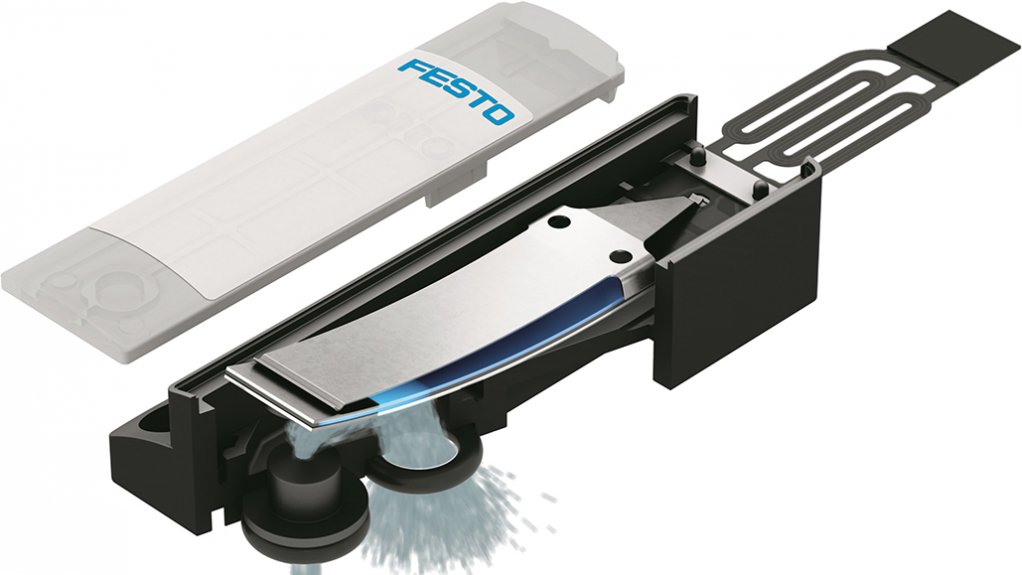Moving into the future with ‘controlled pneumatics’


PIEZO VALVE INTERGRATION New technology push the limits of pneumatics enabling simpler, faster and more efficient solutions
Automation company Festo has further developed its compressed air technology to make its pneumatics sustainable, resource saving and energy efficient.
While the production of tyres and wafers are seemingly very different, both products require the same technology, namely controlled pneumatics.
In controlled pneumatics, Festo combines proportional technology, sensors and control algorithms to form a control loop. These are mechatronic pneumatic systems with innovative valve and communication technology that enable digital influence in conjunction with closed-loop control, based on a sensor variable.
This technology creates new areas of application – especially for pressure and flow control – that push the limits of pneumatics and enable simpler, more reliable, faster, precise and efficient solutions.
Conventional standard pneumatics, on the other hand, are used specifically for simple applications such as point-to-point movements. It is above all the simplicity of standard pneumatics that makes it the ideal solution in many cases.
Digitised Pneumatics
A prime example of a controlled pneumatics product is the Festo Motion Terminal VTEM, which Festo is using to digitise pneumatics. This automation platform uses piezo technology and Motion Apps that can replace over 50 individual components within a pneumatic control circuit.
When applied to tyre production, there is a potential for savings during the loading processes in the curing presses. Through the Festo Motion App “selectable pressure level”, the Festo Motion Terminal allows the green tyre blank (raw tyre without tread) to be gently fed into the press. The smaller the fluctuations of the handling system during loading, the more the feeding-in speed can be increased.
The process for each tyre is thus accelerated by several seconds. With roughly 1.8-billion car tyres produced each year, this can result in considerable sums for each tyre manufacturer. Another advantage of controlled pneumatics is that it reduces the impact forces, significantly increasing the service life of the components used.
Less Pressure Equals Less Energy
In practice, it is not just that the loading operations are accelerated, they also require less energy because pressure can be reduced, and so compressed air consumption is also decreased.
In addition, calculations reveal compressed air savings of nearly 33% when comparing the movement of the horizontally installed pneumatic cylinder DSBC with standard pneumatics, and of nearly 75% when the same cylinder is installed vertically.
Just for controlling the vertical and horizontal cylinders, energy savings of roughly 60% are achieved during these loading and unloading operations.
Predictive Maintenance
The Motion App “leakage diagnostics” is also used, since it simplifies maintenance and automatically monitors leakages. Malfunctions can be detected and pinpointed to a specific actuator using diagnostic cycles and defined threshold values. This results in a reliable basis for predictive maintenance.
Further, the Festo Motion Terminal can close off the faulty air duct, avoiding the supply of more and more compressed air if there is a leak. The innovative automation platform thereby prevents unnecessary air consumption.
Piezo Technology Prevents Wear
When, on the other hand, wafers need to be transported and stored in the semiconductor industry, Festo’s N2 purge system prevents oxygen from oxidising the wafers. The cost- efficient flow controller continuously supplies the atmosphere around the wafer with inert nitrogen.
The flow controller, also known as the mass flow controller, is based on piezo technology and integrated sensor technology.
The design of the piezo valve reduces the risk of contamination of the gas flow caused by particle abrasion over the entire service life. The peak value is around a particle size of 0.1 μm per switching cycle. Conventional solutions generate five times the particle content.
The piezo technology used prevents wear caused by friction, thereby considerably increasing the service life of the valve. In comparison to conventional solutions, this results in significant savings in operation and maintenance.
Low Intrinsic Energy Consumption Saves Money
Owing to its design, the directly operated flow controller reduces the risk of leakages. The electrical energy consumption is less than a watt which is 80% less than with conventional solutions in both cases.
The closed control loop ensures an accurate, stable and linear behaviour of the flow rate, with only minimal hysteresis. The repetition accuracy is ± 0.25% of the setpoint value.
With controlled pneumatics, the related digitalisation and with piezo technology, Festo is taking compressed air technology to a new technological level that is resource-saving, energy efficient and sustainable.
Article Enquiry
Email Article
Save Article
Feedback
To advertise email advertising@creamermedia.co.za or click here
Press Office
Announcements
What's On
Subscribe to improve your user experience...
Option 1 (equivalent of R125 a month):
Receive a weekly copy of Creamer Media's Engineering News & Mining Weekly magazine
(print copy for those in South Africa and e-magazine for those outside of South Africa)
Receive daily email newsletters
Access to full search results
Access archive of magazine back copies
Access to Projects in Progress
Access to ONE Research Report of your choice in PDF format
Option 2 (equivalent of R375 a month):
All benefits from Option 1
PLUS
Access to Creamer Media's Research Channel Africa for ALL Research Reports, in PDF format, on various industrial and mining sectors
including Electricity; Water; Energy Transition; Hydrogen; Roads, Rail and Ports; Coal; Gold; Platinum; Battery Metals; etc.
Already a subscriber?
Forgotten your password?
Receive weekly copy of Creamer Media's Engineering News & Mining Weekly magazine (print copy for those in South Africa and e-magazine for those outside of South Africa)
➕
Recieve daily email newsletters
➕
Access to full search results
➕
Access archive of magazine back copies
➕
Access to Projects in Progress
➕
Access to ONE Research Report of your choice in PDF format
RESEARCH CHANNEL AFRICA
R4500 (equivalent of R375 a month)
SUBSCRIBEAll benefits from Option 1
➕
Access to Creamer Media's Research Channel Africa for ALL Research Reports on various industrial and mining sectors, in PDF format, including on:
Electricity
➕
Water
➕
Energy Transition
➕
Hydrogen
➕
Roads, Rail and Ports
➕
Coal
➕
Gold
➕
Platinum
➕
Battery Metals
➕
etc.
Receive all benefits from Option 1 or Option 2 delivered to numerous people at your company
➕
Multiple User names and Passwords for simultaneous log-ins
➕
Intranet integration access to all in your organisation


















